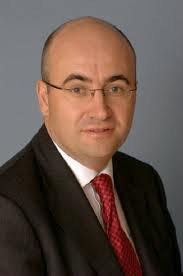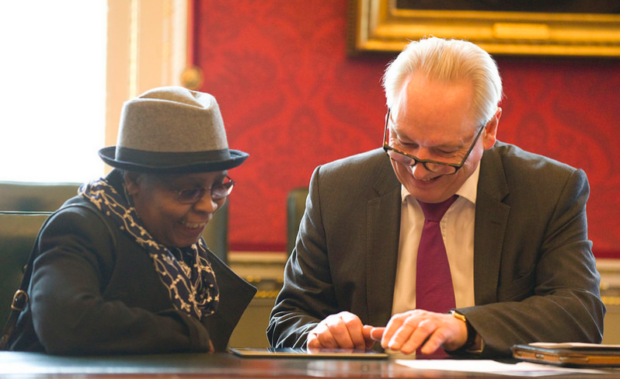 By Jon Rouse, Director General, Social Care, Local Government and Care Partnerships.
By Jon Rouse, Director General, Social Care, Local Government and Care Partnerships.
Just before Christmas I was asked if I would become a Whitehall champion for Digital Inclusion. It was an easy request to say ‘yes’ to. In my role as Director General for Social Care at the Department for Health I work with a number of groups, including older people, offenders and people with learning disabilities, who are more likely than other groups to be excluded from using digital services . If I have an extra opportunity to change that equation it is one that I am very happy to take.
The challenge
We all know that over the last decade, the digital revolution has transformed the way that we live our lives - the way we shop, bank, socialise, all increasingly done digitally. The opportunities that go with this are wide-ranging and potentially life-changing, and everyone in the country should be able to take advantage of them.
Unfortunately, we’re not at that stage yet. As things stand, around one in every five UK citizens lacks the digital capability to take advantage of the benefits the internet has to offer, be it saving on the cost of their household bills, improving their health and wellbeing through increased awareness, staying connected with loved ones across the world or simply having fun.
Government’s role
The Digital Inclusion team at GDS is working with government departments to identify new ways to reach digitally excluded people and to ensure that Government meets its target of a 25% reduction in levels of digital exclusion by 2016.
They're providing advice and support on how digital inclusion can be embedded in relevant policy areas and ensuring that online government services are designed with digitally excluded users in mind. They are also supporting departments and Civil Service Learning to make sure that all civil servants have the basic digital skills needed to do their jobs effectively. On top of that, the team is undertaking research that will give us a better understanding of who is digitally excluded, and what interventions stand the best chance of making a real difference.
They are also working closely to coordinate the efforts of the 70 organisations that have signed the Government’s Digital Inclusion Charter, many of which run great initiatives designed to equip as many people as possible with the skills, access, motivation and trust needed to get the most out of being online.
Initiatives like Barclays’ ‘Digital Eagles’ and Argos’ ‘10,000 Tablets’ have already helped to digitally upskill thousands of people. Additionally, organisations like the Tinder Foundation and Digital Unite have delivered a nationwide network of high quality digital skills trainers, whilst the Connected Housing Initiative has seen Housing Associations come together to find solutions to issues of connectivity, technology and digital skills for residents.
The value of informal support
But for all the formal effort we make to get people online, it’s important that we don’t ignore the potentially transformative benefits of informal support networks, not least the more ‘non-judgmental’ route it provides to increased digital capability. For those who are cautious or less motivated to get online, the prospect of seeking out help through a training provider or stranger is often unappealing.
The great strides that technology has taken in recent years allow us to share our digital skills with others, and it’s something we need to use to our advantage. We don’t need to wait for those in need of support to come to us, we can reach out to them. Thats why today, Minister for Cabinet Office Francis Maude announced the Digital Friends initiative and the vital role that governments and partner signatories will play in implementing it.
Introducing the Digital Friends initiative
 Digital Friends is about creating informal peer-to-peer connections - it’s about encouraging everyone across the country to find at least one family member, neighbour, colleague or friend who doesn’t use the internet, and helping them take that first step.
Digital Friends is about creating informal peer-to-peer connections - it’s about encouraging everyone across the country to find at least one family member, neighbour, colleague or friend who doesn’t use the internet, and helping them take that first step.
Above all else, it’s about helping as many individuals as possible, with the support of someone they trust, to discover the ways in which the digital world can enrich their lives.
Some of the organisations we work closely with are already getting the ball rolling within their own organisations - Argos and the Department of Health will be running small pilots with staff members to test messaging to see what works well and what doesn’t.
But when the Minister for the Cabinet office spoke about Digital Friends recently, he threw down the gauntlet to the whole civil service.
I’ll be asking all government departments to [get involved]. If just one in four civil servants succeeds in getting a single person online, then we’ll have reached over 100,000 people.
There are so many great formal digital champions networks within and across departments that are making a real difference, and the purpose of Digital Friends is to enhance, not replicate, these. But no matter how effective our formal networks are, there is always room for informal support.
So my challenge to you is this: what can you do to get involved? Do you know someone - either in your personal or professional life - who would benefit from the opportunity to improve their digital skills? What is the ‘hook’ that will motivate them to take the first step? There are some great online resources for advice and guidance on how to help at digitalskills.com/volunteers, digitalunite.com and bbc.co.uk/webwise.
In the meantime you may have some other ideas about what you would like to see me do or prioritise in my role as a Digital Inclusion Champion. I’d certainly be interested to hear your personal stories of helping people become confident online and also examples of good practice of promoting digital inclusion across the civil service. You can also connect with me on twitter, @RouseJonDGDH.